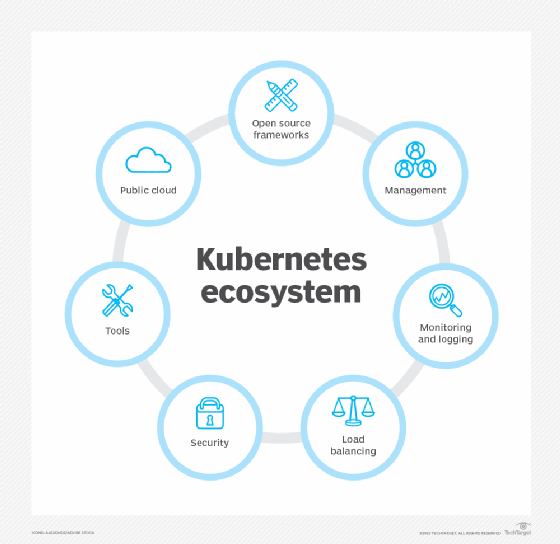
agsandrew - Fotolia
GKE Application Manager does GitOps for Kubernetes config
GKE Application Manager, rolled out in beta this week, bakes in an open source Kubernetes configuration management tool to simplify application deployments to GKE.
Google sweetened the deal for users of GKE this week with a beta tool that bundles in GitOps-style Kubernetes configuration management to application rollouts.
GKE Application Manager, an add-on to the Google Kubernetes Engine cloud service, is part of a push by Google to simplify its public cloud platform and broaden its accessibility to enterprise developers as it fights to increase market share against Microsoft Azure and AWS. It follows similar efforts, such as the Google Cloud Config Connector introduced earlier this month, to streamline Kubernetes deployment automation for applications and services on GKE.
"It's an indication that Google is making a real attempt to ensure it's easy to adopt their technologies," said Jim Mercer, an analyst at IDC. "Google got a little bit of a black eye [in that area] on the cloud side going back a couple years ago, but [Google Cloud CEO] Thomas Kurian has been trying to change that."
Application Manager also aligns with Anthos, Google's platform for container management across multiple cloud services and on-premises environments. GKE lies at the core of Anthos, which bundles in various related Google services such as Stackdriver. Google made Anthos generally available nearly a year ago, and is expected to share details of customer adoption at the Cloud Next conference in April.
One enterprise DevOps consultant said GKE Application Manager could potentially have broad applications, not just for custom app deployments on Kubernetes, but third-party packaged apps as well, through an upcoming integration between Application Manager and the Google Cloud Marketplace.

"This could create a mobile-style app store for back-end applications, which offers more control than a SaaS model but is easier than traditional enterprise self-service portals," said Jeremy Pullen, CEO of Polodis, a digital transformation consulting firm in Atlanta. "It's a middle ground for users that want to support an app store approach but need control over when apps are deployed to production and when and where they're tested first."
Google's enterprise ambitions
Kurian, a long-time Oracle product development executive, came on as Google Cloud CEO in November 2018, replacing Diane Greene. He has overseen a series of acquisitions -- most recently the purchase of mainframe migration specialist Cornerstone Technology -- and built out the sales force in a bid for more large enterprise deals.
Those measures aside, Google will need to continue to broaden its appeal through ease-of-use measures such as Application Manager.
"Among my clients, Google Cloud is often the third choice behind Microsoft and Amazon," he said. "This feels like a way for them to make their cloud more usable."
This shift to higher levels of abstraction is also in line with general IT industry trends: overall, Kubernetes market momentum has shifted away from the container orchestration platform itself and towards advanced add-ons such as service mesh, event-driven computing and the ways container automation can enable GitOps workflows.
To that end, GKE Application Manager connects to Git code repositories and automatically scaffolds them to compile code there according to Google-defined best practices for Kubernetes deployments. It hooks in the open source Kustomize configuration management tool, and stores Kubernetes configuration files in Kustomize format, which allows developers to update Kubernetes configurations without having to dig too deeply into YAML files.
Kustomize users typically access it through the kubectl Kubernetes command-line interface, but Application Manager uses Google's appctl. Application Manager is complementary to Tekton, Google's event-driven CI/CD pipeline built on Knative.
Users have other alternatives in CI/CD tools that use Kustomize. Argo Flux, a CI/CD collaboration between Intuit, Weaveworks and AWS, also integrates with the utility, which has been available since 2017, and is compatible with multiple clouds, while GKE Application Manager is limited to GKE.
"[GKE Application Manager] keeps things clean and simple, and minimizes the heavy lifting for DevOps folks," Pullen said "Right now, it seems most appropriate [for] midmarket companies that aren't trying to do huge custom enterprise apps."







